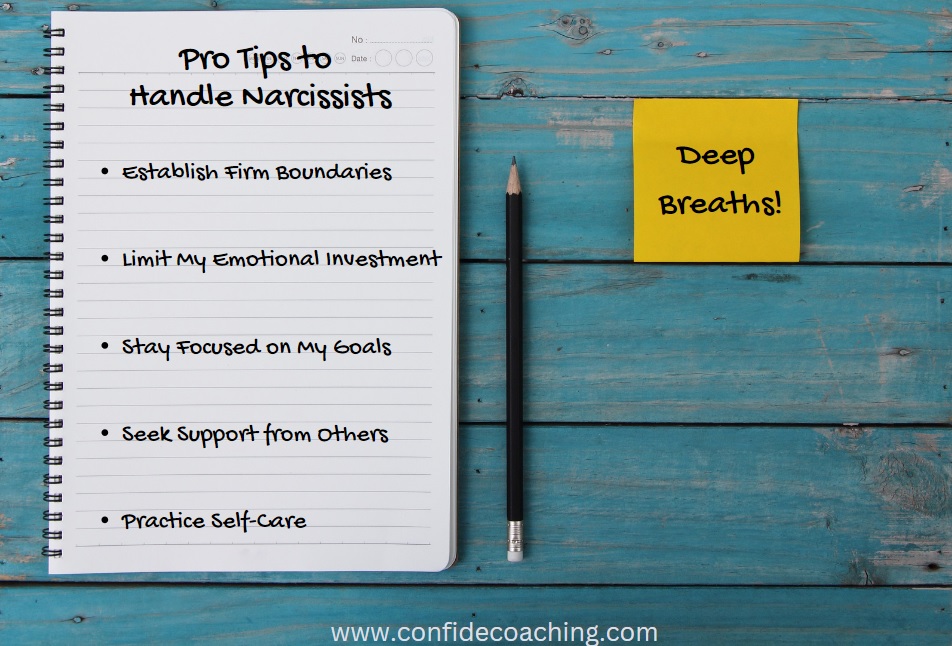
Do you ever feel like you’re walking on eggshells around certain people?
Maybe they seem charming at first, but as time goes on, you realize they’re manipulative and self-centered.
Narcissism and emotional manipulation can wreak havoc on personal and professional relationships, leaving a trail of confusion and hurt in their wake.
As a life coach, I’ve seen how essential it is to recognize the signs of a narcissistic personality and protect yourself from their manipulative tactics.

A Narcissist can be very charming at the beginning of a relationship.
In this article, I’ll share five ways to identify a narcissist and avoid falling prey to their schemes. Plus, I’ll unveil the secret narcissist you may not see coming.
Let’s dive in.
It’s time to reclaim your emotional well-being!
#1 Look for Red Flags in Their Narcissistic Behavior
Recognizing a narcissist can be challenging, especially in the early stages of a relationship. Some people have an uncanny ability to mask their true intentions.
However, common traits and behaviors can help you spot a narcissist. Narcissists often exhibit a sense of entitlement, exaggerated self-importance, and a lack of empathy. Here are a few red flags to watch for:
- Constant Bragging: Narcissists may frequently post about their accomplishments on social media and exaggerate their abilities in order to seek admiration.
- Belittling Others: They may publicly humiliate others, engage in passive-aggressive behavior like sarcastic remarks or backhanded compliments, and frequently compare others unfavorably to assert their dominance or superiority.
- Insatiable Need for Attention: Narcissists may create drama or crisis situations to draw attention, excessively flatter influential people, and dominate conversations to remain in the spotlight.
Trust your gut; if something doesn’t feel right, it’s crucial to explore what else may be at play.
#2 Pay Attention to Their Communication Style
Narcissists often use manipulative language and tactics in their communication, making it challenging to have open, honest conversations with them. Here are a few examples of manipulative communication patterns to look out for:
- Gaslighting: A narcissist might attempt to make you doubt your feelings, memories, or perceptions by denying or twisting the truth. For example, they might say, “That never happened,” or “You’re remembering it wrong.”

Over-dramatizing situations to be the victim is a form of manipulation.
- Guilt-Tripping: They may try to make you feel guilty for expressing your needs or standing up for yourself, such as saying, “If you really cared about me, you wouldn’t do this.”
- Playing the Victim: Narcissists might portray themselves as the victim in any conflict or disagreement, shifting the blame onto you and evoking sympathy for their perceived mistreatment.
When you notice these communication patterns, respond with assertiveness and set boundaries. For example, if a narcissist says, “I’m not sure why you’re so upset,” recognize this as an attempt to avoid accountability. Respond by saying, “It’s important to me that we address this issue and come to a resolution.”
#3 Observe How Narcissists Treat Others
Narcissists often display a lack of empathy and disregard for others’ feelings, resulting in poor treatment of people, particularly those they don’t need anything from.

How people treat wait staff can speak volumes about who they are as a person.
Pay attention to how they interact with service workers, colleagues, or family members.
Narcissists can be charming to those who meet their needs (or have the potential to in the future) but dismissive or cruel to others.
For example, if someone is polite and helpful to coworkers and superiors at work, but constantly berates a waiter, this inconsistency may indicate a narcissistic personality and a lack of empathy in other relationships.
If you’re in a situation where inappropriate behavior is being displayed and you wish to take action, use a calm and assertive approach to address it.
Use “I” Statements: Focus on your feelings and perspectives, rather than accusing the person directly. This reduces the chances of the narcissist becoming defensive. For example, say: “I feel uncomfortable when someone is treated unfairly. I believe in treating everyone with kindness and respect. It would mean a lot if we could work together to create a positive atmosphere in these situations.”
By using “I” statements, you communicate your feelings and expectations without provoking the narcissist, promoting healthier interactions and setting boundaries for your emotional well-being.
#4 Evaluate Their Level of Self-Awareness
Narcissists typically lack self-awareness and refuse to take responsibility for their actions, often deflecting blame onto others instead.

Many Narcissists are completely unaware of their self-absorbed behaviors.
Be mindful of situations where the person refuses to acknowledge their role in a conflict or problem. Recognize when someone is unwilling to take responsibility for their actions and consider whether this is a pattern in their behavior.
A narcissist might blame you by saying, “You always make me angry,” instead of reflecting on their own contributions to the conflict. When faced with a situation where a narcissist refuses to acknowledge their role in a conflict or problem, try the following approach to handle it effectively:
Practice Empathic Assertiveness: Empathic assertiveness involves acknowledging the other person’s feelings while still asserting your own perspective and needs. This approach helps maintain balanced communication and reduces the likelihood of a negative reaction from the narcissist.
In the above example, you could respond by saying, “I understand that you feel angry, but it’s important for both of us to reflect on our actions and how they contribute to the situation. Let’s work together to find a solution that addresses both of our concerns.”
By practicing empathic assertiveness, you can navigate conflicts with narcissists more effectively and encourage a healthier, more balanced dialogue.
#5 Consider Their Priorities and Interests
Narcissists tend to prioritize themselves over others, and they may use their interests and hobbies as tools for manipulation or self-aggrandizement.
Assess if the person is genuinely invested in mutual growth and support or if their focus is primarily on themselves.
Here are a few strategies to help you evaluate if someone’s interests and priorities are genuinely compatible with yours or if they’re using them to control or manipulate you:
- Observe the Balance of Give and Take: In a healthy relationship, there should be a balance of give and take. Notice if the person consistently seeks support for their goals and interests but rarely offers support or encouragement for yours.
- Assess Their Active Listening Skills: A person genuinely interested in your well-being will actively listen to your thoughts, feelings, and concerns. If they consistently interrupt, change the subject, or dismiss your experiences, they may be more focused on themselves.
- Monitor Their Reactions to Your Success: A genuine connection includes celebrating each other’s achievements. If the person becomes envious or tries to downplay your success, it could indicate that their priorities are centered on themselves.
Unmasking the Secret Narcissist
It’s not too difficult to spot an overt narcissist, as their larger-than-life behavior makes them stand out. However, a more elusive type of narcissist exists – the “covert” or “vulnerable” narcissist. These individuals are masters of disguise, often portraying themselves as victims while using passive-aggressive communication to manipulate others.

Covert Narcissists are not so easy to recognize at first glance.
Covert and vulnerable narcissists tend to be hypersensitive and easily offended. They use these emotions to gain sympathy or make others feel guilty. Instead of seeking solutions, they often wallow in self-pity and complain incessantly about their problems.
What makes these people especially dangerous is their hidden motives.
Imagine you’re at work, and a covert narcissist secretly sabotages a coworker’s project. They then swoop in, “saving the day,” taking all the credit for fixing the problem they created.
In personal relationships, covert narcissists might act humble or self-deprecating while secretly craving special treatment or recognition. For instance, someone could downplay their cooking skills, claiming they “just threw this meal together.” In reality, they spent hours perfecting the dish and are fishing for compliments and praise.
Now, picture growing up with a narcissistic parent. It’s an incredibly difficult situation for a child, as they’re often raised in a world filled with guilt-tripping and manipulation. This toxic environment can hinder the development of a healthy sense of self-worth and emotional stability.
Consider a narcissistic mother who plays the self-sacrificing martyr, subtly demanding praise and admiration from her children. She might use passive-aggressive tactics, such as guilt-tripping or the silent treatment, to control and manipulate her children or other family members.
In romantic relationships, a vulnerable narcissist often resorts to manipulation through victimhood, possessiveness, or gaslighting. This behavior forces their partner to provide constant validation and support, which drains them emotionally and diverts attention away from the narcissist’s own shortcomings and responsibilities.
Dealing with narcissists is tough – really tough. But by recognizing their tactics and patterns, we can better understand and navigate the challenges they present.
Pro Tips to Handle Narcissists Effectively
To effectively handle interactions with narcissists and minimize their impact on your well-being, consider employing the following life coaching tips:
- Establish firm boundaries: It’s essential to set clear limits and expectations with the narcissist, both in personal and professional relationships. When these boundaries are crossed, enforce them consistently to maintain control over the situation. Communicate what is unacceptable, but also what is acceptable – many people miss this part in boundary-setting.
- Limit your emotional investment: Narcissists can be emotionally draining, so protect your well-being by maintaining emotional distance from them. Avoid sharing personal information or becoming entangled in their emotional turmoil. This helps to minimize their influence on your mental and emotional health. Narcissists are guns – don’t give them ammunition.

Information about you is the ammunition a Narcissist may use against you. Careful what you share.
- Stay focused on your goals: Keep your personal and professional objectives in mind, and don’t let the narcissist’s manipulative behavior distract you from pursuing your goals. By staying focused, you can maintain a sense of autonomy and prevent the narcissist from exerting control over your life.
- Seek support from others: Dealing with a narcissist can be isolating, so it’s important to seek support from trusted friends, family members, or a life coach. These individuals can offer perspective, validation, and guidance as you navigate the challenges posed by narcissistic relationships. Seek out relationships that are safe–beware of relationships that are under the charming spell of the narcissist.
- Practice self-care: Prioritize your mental, emotional, and physical well-being by engaging in regular self-care practices. This may include focusing on sleep, exercise, meditation, therapy, or spending time with loved ones. By maintaining a strong sense of self and resilience, you’ll be better equipped to manage the challenges of interacting with narcissists.
By recognizing the behaviors of narcissists and implementing effective strategies to handle them, you can safeguard yourself from emotional manipulation and maintain healthier relationships.
Take Home Message on Narcissism
In conclusion, navigating the world of narcissists and their emotional manipulation can be daunting. By understanding how to spot a narcissist, paying attention to their communication style, observing their treatment of others, evaluating their self-awareness, and considering their priorities and interests, you can protect yourself from their tactics.
Moreover, it’s crucial to unmask the covert narcissist and learn how to manage your interactions with them effectively.
Remember to establish boundaries, limit emotional investment, stay focused on your goals, seek support from others, and practice self-care. With these strategies in place, you can safeguard your emotional well-being and foster healthier relationships.
Ultimately, knowledge is power – and by understanding the traits and patterns of narcissistic behavior, you can empower yourself to live a life free from manipulation and control.

Paul Strobl, MBA, CPC
Owner of Confide Coaching, LLC
Paul is a Master Life Coach for GenX and GenY executives and business owners. Originally from Houston, Texas, he has been location independent for most of his adult life. He currently resides in the Rhodope Mountains of Bulgaria near the Greek border with his brilliant wife, 14-year-old stepson (officially adopted in 2021!) and a Posavac Hound rescue.


